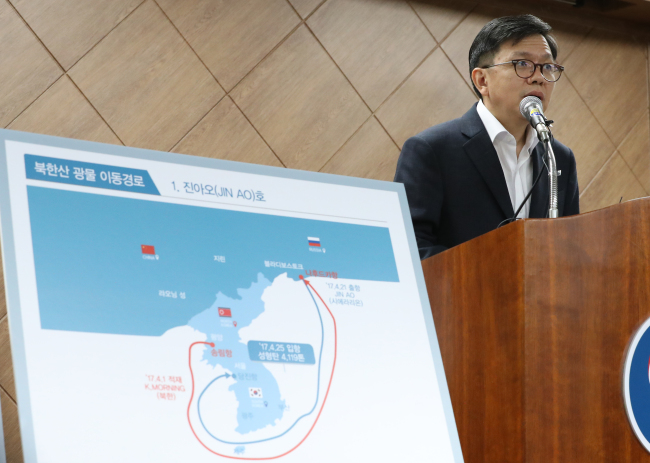Three South Korean companies brought in North Korean coal and pig iron disguised as Russian products in possible violation of international sanctions, the South Korean customs agency said Friday.
Seoul has been examining nine cases of shipments of suspected North Korean coal, which would breach UN Security Council resolutions banning exports of coal and other minerals from the North.
Wrapping up the 10-month investigation, the Korea Customs Service said that the three local companies brought in a total of 35,038 tons of coal and pig iron from North Korea, worth 6.6 billion won ($5.8 million), in seven separate cases from April to October last year.
The local traders unloaded the coal and pig iron from a ship at Russian ports, loaded them onto another ship and forged the country of origin of the resources before carrying them into South Korean ports, the agency said.
The firms illegally brought in the North Korean coal expecting big trading margins after prices of North Korean coal had dropped due to the import ban, according to the agency.
A trader also falsely declared the coal as semicoke, which does not require a certificate of origin, to dodge the customs agency’s inspection of the coal from Russia.
But there was no financial transaction made, as the companies took part of the coal in return for mediating trade between North Korea and third countries via Russia, according to the investigation result.
A total of 14 ships are involved in the illegal shipments of North Korean coal and pig iron. Among them, two are North Korean-flagged vessels and four are China-flagged vessels, according to the ship trafficking site Marine Traffic.
In the first such case, some 4,119 tons of North Korean coal were first brought into South Korea through the Hong Kong-flagged Jin Ao in April. The coal, which was carried from North Korea’s port of Songrim, was transshipped at Russia’s Nakhodka port the same month.
The coal originated from the North Korean ports of Wonsan, Chongjin, Daean and Songlim.
The agency said it would take measures such as an entry ban or seizure of ships if the 14 vessels that transported coal from North Korea to Russia, and from Russia to South Korea, are found to be in violation of the UN sanctions on North Korea.
It plans to refer three firms and three people involved in the illegal coal smuggling to the prosecution.
 |
Korea Customs Service Deputy Commissioner Roh Suk-hwan briefs the media on the investigation into North Korean coal imports on Friday. Yonhap |
The government said it had been allowing the ships suspected of carrying around North Korean coal to freely come in and out of South Korean ports because it could not find solid evidence to intern the vessels.
As for the reason the investigation was prolonged, the agency cited key suspects’ denial of charges, a massive amount of documents and items seized in the probe and difficulties in identifying the origin of the coal.
South Korean authorities launched a probe into the allegations in October last year, after it received tips about South Korean ships importing North Korean coal after transshipping the coal at three Russian ports.
Out of nine cases they looked into, seven cases were found to be involved in the illegal smuggling, according to the agency.
Importing North Korean coal constitutes a violation of the tax law for illegal imports. It is also a breach of the United Nations resolutions, which ban exports of coal and other minerals from the North to cut off an important source of foreign currency that Pyongyang needs to fund its nuclear weapons and missiles programs.
The result of the investigation comes as the opposition bloc steps up attacks against the government, accusing it of loosely enforcing sanctions on the North and even condoning the possible sanctions violations to keep the momentum of dialogue with the communist state.
The main opposition Liberty Korea Party on Friday called for a parliamentary probe into the North Korean coal smuggling.
“The issue guarantees a parliamentary investigation as it can severely hurt national interests,” Kim Sung-tae, the floor leader of the Liberty Korea Party, said at a meeting with party officials.
“This is a grave diplomatic issue that cannot be neglected. We need to reveal who might have violated UN sanctions resolutions or whether the government was aware of (the entry of suspected ships),” he said.
Both the South Korean and US governments said they are closely coordinating on the issue and implementation of sanctions against North Korea amid concerns that South Korean firms’ involvement in the North Korean coal imports could hurt Seoul’s ties with Washington.
The US and South Korea have been engaging North Korea in negotiations to rid the Korean Peninsula of the North’s nuclear weapons program since North Korean leader Kim Jong-un committed to complete denuclearization in return for a security guarantee from the US.
But follow-up talks have seen little progress, fueling doubts over the North’s intention to denuclearize in both South Korea and the US.
Amid a lack of progress on North Korea’s denuclearization and recent reports of the country evading sanctions, the US has stepped up calls for tighter enforcement of the sanctions. South Korea has also supported the move despite a rare thaw in inter-Korean relations.
By Ock Hyun-ju (
laeticia.ock@heraldcorp.com)





![[Exclusive] Hyundai Mobis eyes closer ties with BYD](http://res.heraldm.com/phpwas/restmb_idxmake.php?idx=644&simg=/content/image/2024/11/25/20241125050044_0.jpg)
![[Herald Review] 'Gangnam B-Side' combines social realism with masterful suspense, performance](http://res.heraldm.com/phpwas/restmb_idxmake.php?idx=644&simg=/content/image/2024/11/25/20241125050072_0.jpg)

